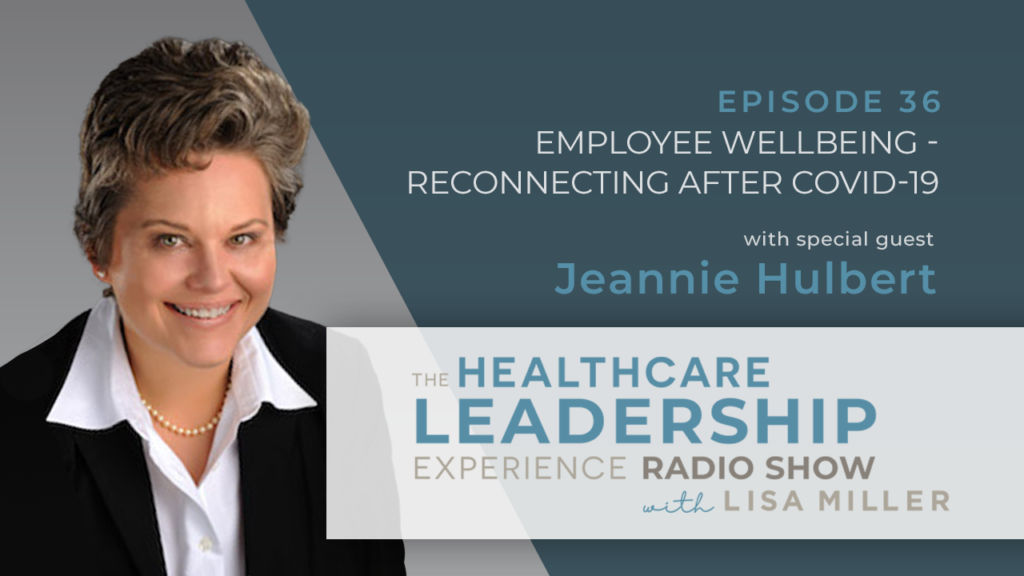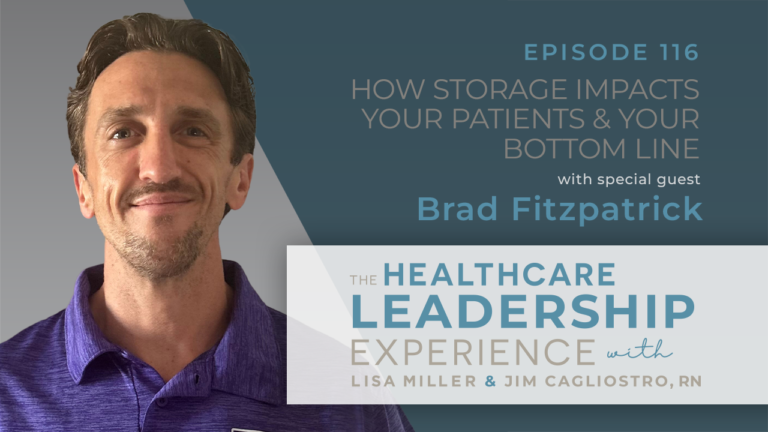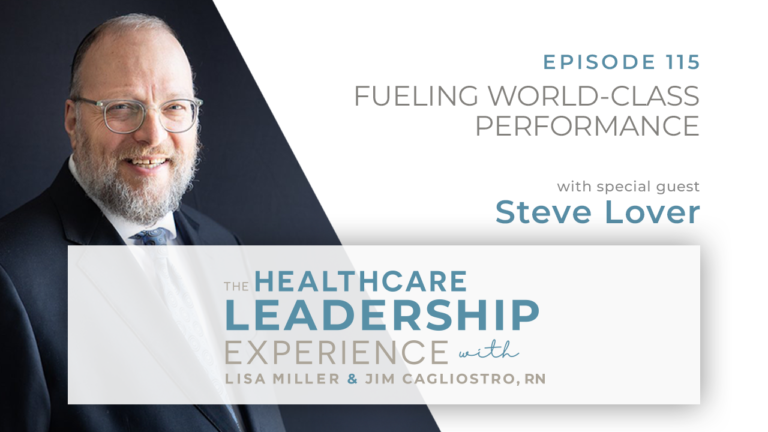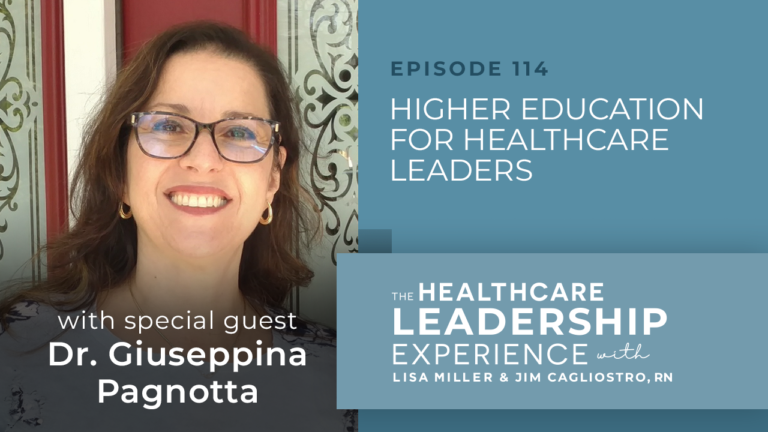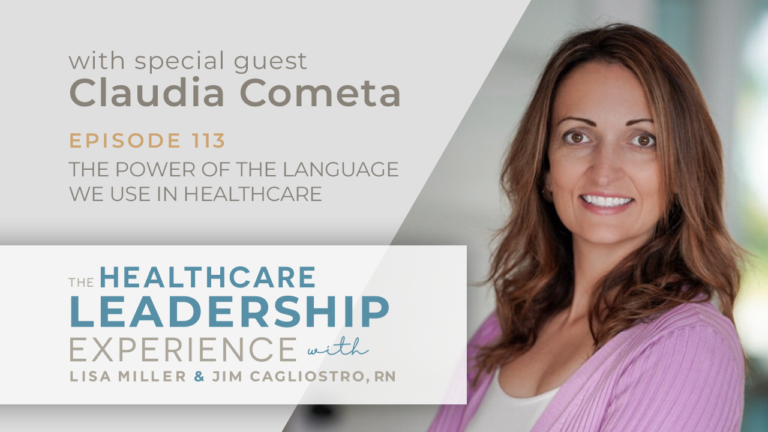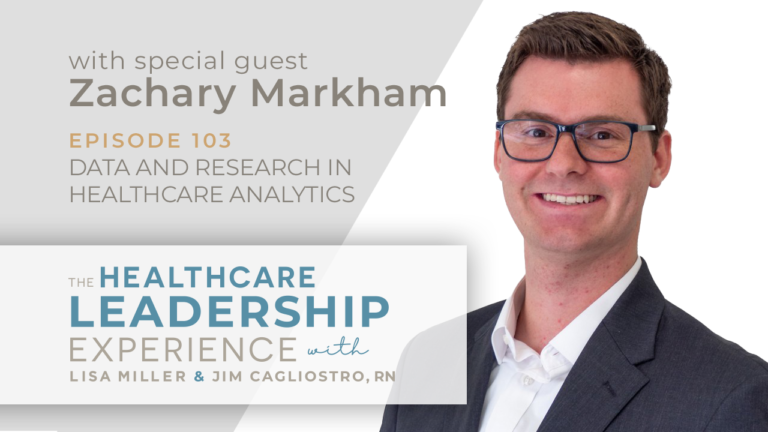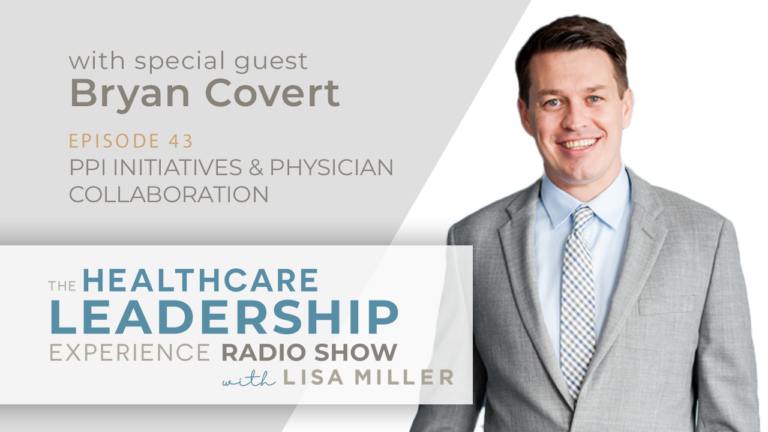Healthcare Needs Out of the Box Innovation To Respond to Employee Wellbeing
In Episode 36 of The Healthcare Leadership Experience, Lisa is joined by Jeanne Hurlbert of Hurlbert Consulting. Together they explore employee wellbeing in the wake of Covid 19, and strategies to enhance and improve the mental health of your employees.
As Jeanne comments: ‘’….in healthcare right now, the most obvious stressor that needs to be addressed is simply the availability of staff, and counseling to help them deal with the inescapable effects of what they’re doing right now.’’
This episode is sponsored by VIE Healthcare Consulting® which has proudly helped hospitals save $772 million since 1999.
In this episode you’ll hear:
Jeanne’s background, her work after Hurricane Katrina and her ‘’superpower’’; why asking the right questions in the right way makes all the difference.
The clear parallels between the impact of Hurricane Katrina and the pandemic on wellbeing and mental health. ‘’If that’s the nurses and physicians in a hospital, it’s going to affect their productivity and judgement. But there’s a light at the end of the tunnel.’’
Three vital types of social support: instrumental, expressive, emotional.
How close personal connections with co-workers can increase employee satisfaction, and why it’s vital in healthcare.
Why healthcare needs out of the box innovation to respond to employee wellbeing – and why there’s no ‘’one size fits all’’ solution.
Effective wellbeing strategies for healthcare organizations to support their employees. ‘’If a healthcare worker is exhausted, afraid and worried about what they’re taking home to their family, they’re going to be reticent to be reaching out.’’
The challenge of understaffing and the growing divide between ‘’travel’’ and ‘’local’’ nurses, plus how a defined wellbeing program helped one small hospital compete, ‘’If companies are willing to pay for counselling it’s a big deal.’’
For more resources download our Research Report Hospital Resource Guide to Post-Pandemic Recovery.
Connect with Jeanne via www.hurlbertconsulting.com or on 225 485 7909.
Connect with Lisa:
📧 lmiller@spendmend.com
📱https://www.linkedin.com/in/lisamiller/
Episode Transcripts
CLICK HERE TO DOWNLOAD THE PDF TRANSCRIPT
CLICK HERE TO OPEN THE TRANSCRIPT
Introduction (00:02):
Welcome to The Healthcare Leadership Experience Radio Show, with your host, Lisa Miller. Lisa is an entrepreneur, inventor, advisor, and founder of VIE Healthcare Consulting, the leading healthcare advisory and analytics firm, helping hospitals accelerate their margin improvement goals. Lisa loves to think differently and collaborates with leaders and their teams to solve challenges and to create new innovative approaches that impact the clinical and business side of healthcare. Our show will bring you leaders and innovators within healthcare and across multiple industries. Be a part of the discussion that will give you a unique perspective, deep insights, and roadmaps to successfully help you navigate the clinical, financial, and operations of healthcare. Your show starts now.
Lisa (00:49):
Hello, you’re listening to The Healthcare Leadership Experience Radio Show on HealthcareNow Radio. I’m your host Lisa Miller. So welcome to the show. Today’s guest is Dr. Jeanne Hurlbert with Hurlbert Consulting. And I’m excited to have Jeanne here because she’s a colleague, a collaborator, and a friend, and we’ve worked together for many years. But let me get you some background about Dr. Hurlbert. She earned her Ph.D. from the University of North Carolina, and she has worked with some of the largest companies in the world — from the Anthony Robbins Companies, to Strategic Coach, again, my company, although we’re much smaller. Worked with Bright Line Eating and six New York Times Bestselling authors. And she’s had such a diverse and unique background, she’s gonna share that today. And some of her really unique specialties are survey research, data analytics assessments, social scientific analysis, disaster research, couple that with her entrepreneurship makes Jeanne a very unique dynamic, and as you’ll hear today, such an interesting person. So, Jeanne, welcome to the show.
Jeanne (02:00):
Thanks so much, Lisa. It’s great to be here.
Lisa (02:02):
Awesome. So Jeanne, do you just wanna give everybody a little background of you before we kind of jump into some of the questions and some of the, the really interesting topic today we have.
Jeanne (02:13):
Yeah. I grew up in a town of 200 in a county of 9,000 in Northeastern, North Carolina. And my father was a country banker and I learned a lot about how important it is to know your customers from watching him interact with people. And so what I do in my business really puts that into practice. I spent over 20 years in academia, uh, on faculty at Louisiana State University, and then began the consulting business, and then eventually left the university to do this full time. And I’m privileged to love what I do. I mean, I love the companies with whom I work, you know, I’m a certified geek, and so for me, this is fun.
Lisa (02:51):
Yeah. And before we, again, we jump into some of the discussions today, you worked on this really great healthcare leadership project for me back in 2017, 2016/17, and where we did some research, uh, to C-suite executives. And it was just one of the most brilliant projects I’ve ever been a part of, and you really were able to get into some deep insights. And for us it was fantastic because we were able to help and support our customers and others in the marketplace. So I, I feel like that’s one of your superpowers, right? Is to be able to formulate survey questions in, in, in such a way that you’re going to get real meaningful insights. So that was our first project together.
Jeanne (03:37):
Yes, it was. And thank you. I love working with you and with VIE. But you hit the nail on the head, it’s all about asking the right questions, the right way. And that’s what makes all the difference. And very, very subtle shifts matter.
Lisa (03:51):
So we’re gonna talk today a little bit about your background and in terms of your work, right? So I know you’ve had a lot of concrete information for organizations right now, but I wanna take a step back and talk about the other Black Swan event you did research on, which is hurricane Katrina. And you and I have had a lot of discussions around this, and it’s so fascinating the work you did with hurricane Katrina and you know, the impact after. Can you tell us a little more about what you studied, what you found that was relevant for the situation that we’re in right now, and I’m, you know, meaning the pandemic and just a lot of the stresses that are coming along with that?
Jeanne (04:31):
Absolutely. And they’re clear, clear parallels. We actually did research before Katrina and collected data that went into FEMA for the hurricane Pam exercise. After Katrina, we re-interviewed some of those same individuals, and that’s a rare opportunity in a disaster ’cause you never know when, when and where it’s gonna happen to have pre-post data. So it’s… That was very instructive. We looked at network structures, we measured their level of social support, and we looked at mental health effects. Now, the index mental health effects that we use taps depressed mood. And it’s a very, very, very simple measure. It just has seven items. It says how many days in the last week have you felt you couldn’t get going, felt sad, had trouble sleeping, felt everything was an effort, felt you couldn’t shake the blues, felt lonely, or had trouble focusing on a task?
Jeanne (05:22):
So think about those seven things for a minute. If that’s your employees, if that’s the nurses and physicians in a hospital, it’s gonna affect their productivity, it can affect their judgment, it can have all sorts of effects. And we know that these effects are out there right now. I spoke with someone in NIMH who thinks the mental health effects will be deep and long. But there’s a light at the end of the tunnel here, and that is that we indeed found 18 months post-Katrina that depressed mood was still twice pre-Katrina levels, but it wasn’t true across the board. 49% of those who said they had enough people to help ’em only some of the time reported a high level of depressed mood, but that was 23% among those who said they had enough people to help them most of the time, and it fell to 19% if they said they had enough people to help them all the time. Now, what that meant measures is what we call social support. And do you want me to go into the different types, Lisa?
Lisa (06:23):
I do. I, I think this is perfect because you and I had a, a conversation yesterday and we started talking about this and it’s actually on my notes.
Jeanne (06:30):
Okay. Those are actually really dramatic differences, those are big. The difference between almost half the sample having high levels of depressed mood and 20% of the sample, that’s a stark difference. And that there are basically are three types of social support. There’s instrumental help, which is getting help, getting things done, whether that’s solving work-related problems or getting help in our personal lives. And then there’s expressive or emotional support, which tends to come from our strong ties, our close friends and relatives. Whereas the instrumental support can come for our strong ties, but it very often comes from our weaker ties, co-worker connections, friends of friends, that sort of thing. And in fact, if you wanna find a job, your best bet is not your close friends and relatives, it’s your… It’s a weaker ties because they can reach out to places you can’t necessarily get to. But here’s what that means for organizations right now, it’s critically important to keep everybody engaged and connected, to do everything you can to get the support you need and help your team get the support they need.
Lisa (07:37):
So here’s the question and here’s the thinking, on the instrumental support, now that’s the getting things done. That’s could be projects, food, you and I talked about this a little yesterday, that could be you needing help putting a table together. You know, it’s the overwhelm with life and it’s the help of getting things done. And I don’t think employers have done enough thinking about this instrumental support, that help, and that could it be just a wonderful way for employers to say, “Wait a minute, we can support getting things done. We can support the activities that our employees are challenged in with.” You know, we are in the sandwich generation, so it’s whether childcare or it’s elderly senior care, or it’s just getting to places, but I think this is a, a place where employers could really make a meaningful impact, Jeanne.
Jeanne (08:29):
Absolutely. And I think you and I had a great conversation yesterday and we basically thought about two ways they could do it. One is, to provide a nexus where employees can connect with each other and say, I need this, or I can provide this, and the other is for the organization itself to provide forms of instrumental support that they’re aware their employees need. And either of those things is extremely effective.
Lisa (08:53):
Right. And you said that employee satisfaction also, the research shows that their connection with their employees is a very important part of overall satisfaction. So now if you have this nexus, this way of saying listen, I need help or I can give help, so it’s, it’s both, you’re helping with the instrument support, but you are also helping with this other subsection, which says co-worker connection also it matters and employee satisfaction.
Jeanne (09:24):
Absolutely. You hit the nail on the head. I published a paper a few years ago that showed that the greater the extent to which employees count coworkers as among their close personal connections, the higher their job satisfaction is. So if you can get these kinds of social exchanges is the complete foundation of society. And so if you can get these exchanges going then that has the potential to help the coworkers connect with each other more strongly, which can impact both their productivity and their job satisfaction. And think about in the context of a hospital, think about how many times somebody needs help from somebody else to get something done, whether it’s in an emergency room or, you know, on a floor or whatever, those connections in that environment become critically important.
Lisa (10:11):
Yeah. I would love to see how you’re going to be developing this nexus because I, I think it’s an untapped area and such a wonderful way for organizations or, you know, for these discussions for hospitals to say, wait a minute, let’s create an environment where we can say I need help, or these are the things I can help with.
Jeanne (10:32):
Right.
Lisa (10:33):
And then this becomes a strong community and where, you know, the many can do a lot more. And I think there’s a lot there, Jeanne, looking forward to, to having that further discussion. I heard a physician who’s on faculty at Baylor College of Medicine say that he feared the mental health effects of this crisis would equal the physical health effects. Can you talk more about that?
Jeanne (10:56):
I think we’re already seeing it, and I think honestly they’re exceeding the physical effects in some cases. Okay? And let’s just… I was gonna suggest that we just take healthcare as an example. Is that okay?
Lisa (11:07):
Yes, absolutely.
Jeanne (11:08):
Okay. So something from NIMH, doctors, nurses, and paramedics working as a frontline force to fight the COVID-19 outbreak maybe more susceptible to develop mental health symptoms. Fear of catching a disease, long working hours, unavailability of protective gear and supplies, patient load, unavailability of effective COVID-19 medication, death of their colleagues, social distancing and isolation from family and friends, and the dire situation of their patients may take a negative toll on healthcare workers. And then we’ve got some specific data to look at. A significantly greater percentage of patients with a COVID-19 diagnosis experienced a new onset of mental health conditions following the diagnosis, compared to patients who tested negative.
Jeanne (11:54):
Among patients who experienced a new onset of mental health condition, the most common types were anxiety, and that was 70 to 75% of the people diagnosed, and major depression, 31 to 33%. You’re talking about a third of diagnosed folks with major depression, that’s dramatic. The odds of developing a mental health condition after a COVID-19 diagnosis were significantly higher among individuals with health-related social needs associated with childhood upbringing, education, employment, or housing. So in other words, the less resources they have, the less equipped they are to manage, the more likely the mental health effects are gonna emerge.
Lisa (12:35):
It’s overwhelming to hear the impact of COVID, particularly in healthcare, right? And of course, now we’re we have the staffing issues.
And when we return from break, I’d like to focus on a little bit more about this talking about depressed mood and, you know, I wanna get the audience, I think this dire state we’re in, however, what you’re doing to change that. And, you know, I think we wanna get to the solution, the action items, what’s on the other side and what people like you are doing to making an impact on an organization?
So if you’re just tuning in, you’re listening to The Healthcare Leadership Experience Radio Show on HealthcareNow Radio. And I’m Lisa Miller, your host. Today, I’m joined with Dr. Jeanne Hurlbert from Hurlbert Consulting. And we are talking about the impacts of COVID and her correlation with her work, with, uh, hurricane Katrina and what we can do now to really help employees and employers really pave the way to help in this crisis.
Lisa (13:42):
This show is sponsored by VIE Healthcare Consulting, the leading healthcare advisory and analytics firm, helping hospitals accelerate their cost savings and margin improvement goals since 1999. You can learn more about VIE Healthcare at viehealthcare.com.
All right, Jeanne, we are back, and I want to continue a little bit more with your research and then get to, you know, some of the solutions and things that you’re working on. How do you combat depressed mood? You talked a little bit earlier about social support — can you speak to how do you combat depressed mood?
Jeanne (14:18):
I think you have to have a toolkit. You have to have a lot of different strategies because there’s not a one-size-fits-all solution. For some people it’s gonna be counseling, for other people it’s gonna be more social support. For still others, it’s gonna be maybe three or four different strategies together. So, the first thing to move away from is the idea that there’s a one size fits all solution because there isn’t.
Lisa (14:41):
And no, and I’m glad you said that, and I want you to continue. ‘Cause I feel like it’s like, okay, well you can talk to somebody like, okay, we have mental health counselors ready. And, and that’s certainly very important. But to me, there’s so many other things that, you know, I, I recently heard about an organization that’s providing parents with the ability to counsel virtually for their children or provide their children with their support. I think you’re right, it’s a tool belt and, and I’d love for you to, you know, kind of continue sharing with me what you feel that tool belt should be.
Jeanne (15:13):
Thank you. Well, I loved it when you told me about that organization, because that’s exactly the out-of-the-box kind of interventions that we need in addition to traditional counseling. And I’m a sociologist and a sociological approach to this is yes, we need to treat the depressed mood, but we also need to go to the source of the stress because if we can reduce or eliminate the source of the stress, then we’re gonna reduce the effects that we see with depression. And that’s something that, you know, there’s several sociologists who have written about this, that’s something that organizations in the United States have really not paid attention to. To the extent that they do anything, they’re providing resources to treat the effects, but not really looking at what’s creating the stress, okay? So for example, we created this program where we go in and we assess the needs in an organization. All right.
Lisa (16:10):
So Jeanne…
Jeanne (16:11):
And when we…
Lisa (16:11):
… Well, can you tell the name of the program? I’m sorry to interrupt, but can you share the name of the program?
Jeanne (16:16):
It’s great. Yeah, it, well, the original program is called Team Touch Points, and then we have a version for healthcare that’s called Hope for Healthcare, and it’s the same program except tooled for these two different environments, ’cause obviously the needs in healthcare differ from the needs in other organizations. And so the idea is to go in, take the temperature of the team, figure out what resources they need, and the data that we have gotten from teams so far, coupled with our data from hurricane Katrina, underscore how important it is to support your team right now. Because as we’re about to share, the team data show the effects of pandemic stress, very clearly. There’s no doubt about it. And our Katrina data showed that even in a natural disaster, those effects are persistent. Okay?
Jeanne (17:01):
So what we see is nearly a third, 29% of surveyed employees are experiencing work stress. Okay? If a third of your workforce says, yeah, I’m feeling stressed. We, we used a measure that, asked how much they have to do, have too much to do in the time available. Well, think about that measure in the context of healthcare, where it is so horribly understaffed right now, I’m sure that number would be far higher in that environment. 71% report they struggle with the stress of meeting their personal and work responsibilities. And then as we would expect, these are the stressors, okay, what are the results of the stressors? 40% of the employees we’ve surveyed so far said their quality of life is only good. More than one in four said they had trouble keep their minds on what they’re doing three or more days in the week preceding the survey.
Jeanne (17:54):
Now in any organization, if you have a third of your workforce that couldn’t keep their mind on what they were doing three or more days in the week preceding the survey, that’s an alarm bell, but in healthcare it’s really dramatic. Because when people can’t focus in healthcare, the cost can be exceedingly high.
Lisa (18:13):
Yeah, absolutely. And I, I wanted to pause for one moment because those stats are just… They’re mind boggling, right? Where they feel overwhelmed, they can’t do their responsibilities, or they’re thinking about other things they have so, you know, maybe they, again, they’ve got kids that are, you know, struggling because of the pandemic or parents. And I think that what you said earlier about getting to the source of the stress, so it’s going to be specific and different and precise to each person. And this is not a one-stop-shop, it’s really trying to figure out what that person needs. And, and, uh, I hope you’re gonna get to how you do that, right? ‘Cause I know that you have a very unique assessment, and there’s very specific results, and there’s action items. But I, I want you to continue with your program and, and what you’re seeing as your role in and out that program?
Jeanne (19:04):
Yeah. Over 18% said they couldn’t get going, felt sad, felt lonely, three of them had depressed mood indicators, at least three days, that’s almost 20% of the sample. So think about that. If this is true for your employees, if they’re anxious about contracting COVID, which healthcare workers obviously are, if they feel isolated from friends and family and even their coworkers, you’re gonna see these stresses in disrupted sleep, trouble focusing, and other symptoms of depressed mood. You’re gonna see health effects, you’re gonna see healthcare costs, and you’re gonna see other direct and indirect effects in your company or hospital. And I think in healthcare right now, the most obvious stressor that needs to be addressed is simply the availability of staff, number one, and number two, counseling to help them deal with the inescapable effects of what they’re doing right now.
Lisa (19:56):
Absolutely. What kind of interventions are you seeing or that you think need to be put in place that aren’t there, right? So we know that there’s a lot of companies emerging now to support mental health, but what you’re talking about is a little different. And what do you think the gap is, Jeanne, in terms of what, well, specifically healthcare needs to do to support their employees?
Jeanne (20:20):
I think it’s a two-pronged strategy. Okay? I think it’s you first of all, you can’t address what you don’t measure, right? So you need to go in with really solid measures of all the things we just talked about, perceived adequacy of social support, work stress, how they feel when they’re being supported in the hospital, depressed mood, and perceived adequacy of social support. ‘Cause you’ve gotta look at all that. Then you can start to say, we have a substantial cadre of people who A, are suffering from depression, and B, don’t have enough support to combat it. Okay? And then you start with a two-pronged solution. I mean, traditional counseling is great, but traditional counseling does not tend to focus on social support. It doesn’t teach people how to make connections. If a healthcare worker is exhausted and afraid and worried about what they’re taking home to their family, they’re gonna be reticent to be reaching out to a lot of people.
Jeanne (21:18):
It’s a tough situation for them to be in, and so I think the more the organization can conceive of wellness broadly as something in which you’re looking at both structural effects and you’re looking at psychological effects and addressing both — that’s when things can start to change. And one of the other things that healthcare needs to look at right now, in my opinion, I mean, this is a little bit off the track, but you know, we’ve got a situation in a lot of hospitals where they’re woefully understaffed and travel nurses are coming in and frequently being paid dramatically more money than the local nurses. That’s just one more stressor for the local people, plus it’s a structural situation that is gonna set up antipathy or a high probability of antipathy between the travel nurses and the local nurses.
Lisa (22:06):
Yeah, absolutely. I, you know, hearing a lot more of those issues everywhere around the country right now. And I think the goal would be how do we build up our employees, our nurses, and, and how do we support them? And particularly in this instrumental support, like, you know, things that they’re… The structural support because you’ve, you’ve had insight from Katrina to show that that is an area that really is actionable. And you know, otherwise that depressed mood will continue if they don’t feel like they have help. And help could be a wide range, it could be something as simple as needing a ride or, you know, help bringing the food into the house. So I have a neighbor and struggles a little bit just kind of lifting. She’s not necessarily older, and she just needs sometimes the items lifted from the… Her front of her house into her house, something so small. But not only does that help her, there’s also, it creates that connection. And they’re so closely tied together.
Jeanne (23:03):
They absolutely are, Lisa, you’re exactly right. And that’s just not happening organically these days.
Lisa (23:08):
Yeah. If anything, it, I think the other going the other way. You know, as we wrap up and I, I would love to continue this conversation, can you just share a little bit about your program? And sometimes when people hear assessments or surveys, they think, oh, my employees are… They won’t wanna share. Can you share about your program? Because you know, there is privacy to it. There’s a lot success. You find that most of the times the employees are really looking for a way to share, even in this might be perceived sensitive area, but you’re, you’re finding the opposite that people wanna open up and they want the vehicle and companies are really able to see the data and then you create actionable items. Can you share a little bit about it?
Jeanne (23:49):
Yeah. Well, first of all, confidentiality piece is huge. I am bound by a code of ethics. We are an independent third-party research firm, and so we have the ability to go into the organization and I think assure them as, as much as they can be assured that no, no data that can identify individuals either indirectly or directly. And that indirectly or directly piece is important. There’s a reason the Census Bureau doesn’t re- release data below the quad group level, and it’s because if I saw data on a single African American female with two kids on my block, I know exactly who that was. That’s identification indirectly. All right. So you have to protect confidentiality both ways. And so what we do when we go into the organization, is we get an agreement with the company or the hospital that we will collect data and we will give them aggregate data, but everybody’s identity is protected.
Jeanne (24:46):
Now, once we get the data, we’re gonna show them what the patterns are, and then we’re gonna say, all right, you don’t have enough connections among your coworkers, here are some strategies that could help that. These people lack social support, here’s some strategies that could help that. And we’re gonna go down the line. If the company wants, we can identify individuals who are clearly struggling, who, you know, hit a threshold on depressed mood, who hit a threshold on support, and we can reach out to them, and in many cases, the organization has actually paid for counseling for its employees. Okay? That shows a very, very strong commitment to your workforce.
Jeanne (25:26):
And yeah, I was talking to somebody who’s on the board of a small hospital this week and he said, they’re competing against the big hospitals for nurses and they’re not winning the battle. And he said, things like this can help give them an edge because it shows the commitment. And mostly that commitment has been very good, when we’ve identified people, you know, and if the company is willing to pay for counseling or a hospital, that’s a big deal. I think that really demonstrates loyalty to the individual.
Lisa (25:57):
Yes. So Jeanne, can you tell everybody where they can reach you as we wrap up today?
Jeanne (26:02):
Absolutely. Um, it’s www.hurlbert, H-U-R-L-B as in boy, E-R-Tconsulting.com, or they can reach out to me directly at 225 485 7909.
Lisa (26:18):
Yes. And you’re also on LinkedIn. Thank you, Jeanne.
Jeanne (26:21):
I’m on LinkedIn.
Lisa (26:23):
Yeah, that’s great.
Jeanne (26:23):
Thank you, Lisa. It’s great to be here.
Lisa (26:25):
Yes. If you’d like to know more about Jeanne’s work, you could also read out to me.
Thank you for listening to The Healthcare Leadership Experience Radio Show on HealthcareNow Radio. I’m Lisa Miller, the host, please join us on Healthcare Now Radio every day at 5:00 AM, 1:00 PM, 9:00 PM Eastern time and other podcast channels.
You can also listen to some other great radio shows on HealthcareNow Radio like Health Unabashed, The Virtual Shift, Payment Matters and many others. And if you’d like to hear a topic, please reach out to me. Thank you for being on the show Jeanne and thank you everyone…
Jeanne (27:01):
Thank you.
Lisa (27:01):
… For listening.
Outroduction (27:02):
Thank you for joining Lisa Miller for this episode of The Healthcare Leadership Experience Radio Show sponsored by VIE Healthcare Consulting. If you enjoyed the show, subscribe so you can automatically get notified when new shows premier weekly. Don’t forget to leave us a review so more healthcare leaders like you can discover us. This show is on HealthcareNow Radio, Apple podcast, Stitcher, Spotify, Pandora, and other major podcast platforms. To reach out to Lisa personally, you can join the conversation on LinkedIn, where Lisa continues to have discussions on the business of healthcare.
You can find links to Lisa’s other social platforms in the show notes or at viehealthcare.com. The Healthcare Leadership Experience Radio Show is the think differently communication for healthcare leaders, and we are honored to have you tune in.
Join us next week for another episode of The Healthcare Leadership Experience Radio Show.
